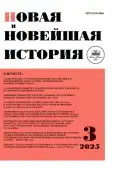Irreechaa: Oromo National Identity and the Revival of Traditions in Contemporary Ethiopia
- Autores: Ivanova L.V.1
-
Afiliações:
- Institute of World History of the Russian Academy of Sciences
- Edição: Nº 3 (2025)
- Páginas: 149-158
- Seção: Contemporary history
- URL: https://journals.eco-vector.com/0130-3864/article/view/685327
- DOI: https://doi.org/10.31857/S0130386425030121
- ID: 685327
Citar
Texto integral
Resumo
Irreechaa, the annual festival of the Oromo – Ethiopia’s largest ethnic group – has undergone a remarkable transformation, evolving from a banned event to a recognised element of national cultural heritage and an attraction for international tourism. This shift has been facilitated by national policies and the growing academic study of Oromo culture and history. Originally devoid of political connotations, Irreechaa has increasingly become a tool for revolutionary change and a symbol of the Oromo struggle for official recognition of their national identity and historical contributions to Ethiopia. It has also become central to the Oromo national consciousness, known as “Oromummaa”, which is based on three key elements: ethnicity, the Oromo language, and ancestral land. The ritual of Irreechaa simultaneously affirms the distinctiveness of the Oromo while also connecting them to the broader ancient African cultural tradition, in which beliefs in the spirits of water and trees were widespread. Despite religious diversity among the Oromo, many consider themselves followers of “waaqeffanna”, their traditional faith, of which Irreechaa is an integral part. Furthermore, representatives of other Ethiopian ethnic groups also participate in the annual pilgrimage to Oromo sacred sites. As Irreechaa gains increasing media attention, its original sacredness is gradually diminishing – just as historically sacred sites are being transformed by tourism infrastructure – an arguably inevitable consequence of globalisation.
Soviet and Russian scholarship, historically rooted in Amhara-centric perspectives, has largely overlooked Oromo culture, focusing primarily on the “gadaa” age-class system. However, in recent years, there has been growing academic interest in the Oromo national movement, particularly among its youth.
Texto integral
Sobre autores
Lyubov Ivanova
Institute of World History of the Russian Academy of Sciences
Autor responsável pela correspondência
Email: caashoru@mail.ru
ORCID ID: 0000-0002-2378-5598
Scopus Author ID: 57219596463
кандидат исторических наук, старший научный сотрудник Центра региональных исследований
Rússia, MoscowBibliografia
- Bartels L. Oromo religion; myths and rites of the western Oromo of Ethiopia an attempt to understand. Berlin, 1983.
- Bulcha M. Oromia’s Irreecha Festival – A Revival of an Ancient African Culture. An Attempt to Understand and Explain // URL: https://advocacy4oromia.org/irreechaa/oromias-irreecha-festival-a-revival-of-an-ancient-african-culture-an-attempt-to-understand-and-explain/ (access date: 19.08.2024).
- Debele S. Locating Politics in Ethiopia’s Irreecha Ritual. Studies of Religion in Africa. Vol. 49. Leiden, 2019.
- Debele S. Reading Prayers as Political Texts: Reflections on Irreecha Ritual in Ethiopia // Politics, Religion & Ideology. 2018. № 19 (3). Р. 354–370.
- Gammachu M. The Oromo world view // International Disciplinary seminar of the Institute of Ethiopian Studies, 1998. Vol. 1. № 4. P. 41–54.
- Gemechu G. Irreecha: An indigenous Thanksgiving ceremony of the Oromo to the High God Waaqa // Critical reflections on indigenous religions / ed. J. Cox. Ashgate, 2013.
- Jalata A. The culture roots of Oromo. The Red Sea Press. Eritrea, 1998.
- Leykun S. “Irreecha” Ceremony among Shoa Oromo // Journal of Science and Sustainable Development. 2014. № 1 (3). Р. 96–110.
- Meskerem A. “Erreecha” // 19th Institute of Ethiopian Studies international Conference. 1998. Vol. 2 (1). Р. 315–340.
- Meskerem A. Women of Erecha // African Identities, 2004. Vol. 2. № 1. P. 53–76.
- Regassa A., Zeleke M. Irrecha: A Traditional Oromo Religious Ritual Goes Global // The Public Face of African. New Religious Movements in Diaspora: Imagining the Religious Other Ashgate / ed. A. Afe. Burlington: Ashgate. 2014. URL: https://archive.org/details/publicfaceofafri0000unse/page/n7/mode/2up (access date: 19.08.2024).
- Salviac M. de. An ancient people, Great African of nation: the Oromo. Sage Publisher. Paris, 1901.
Arquivos suplementares










